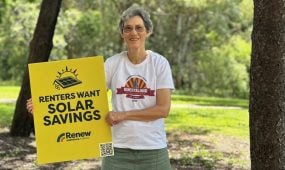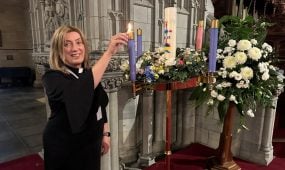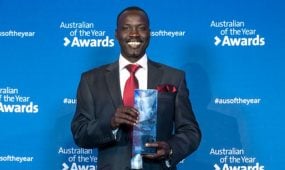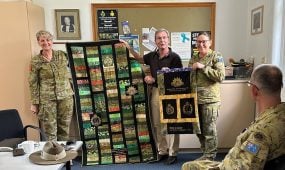Q&A with The Ven. Rod and Dianne Winterton
Spotlight Q&A
Meet The Ven. Rod and Dianne Winterton and find out about their Brisbane and Western Region ministry highlights and about their personal faith journeys
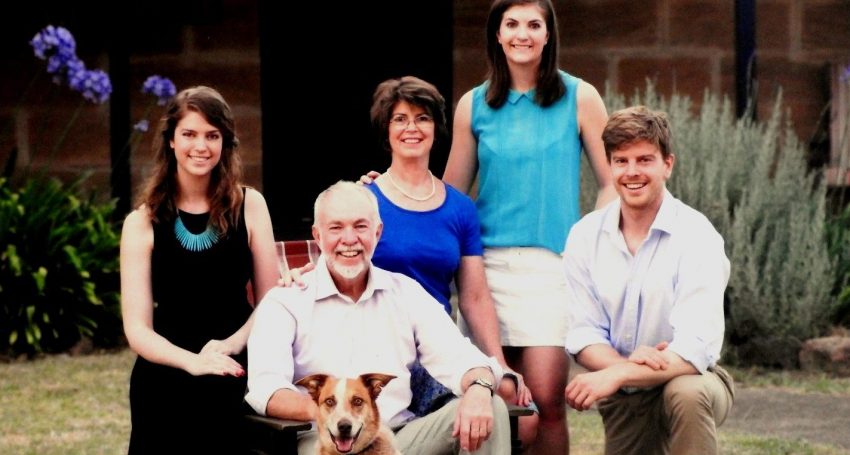
Story Timeline
Priest and Priest Spouse: Ministry together
The Ven. Rod and Dianne Winterton have been a priest and priest spouse for nearly twenty years. In this Spotlight Q&A, they share about the highlights of their ministry together and about how their faith inspires their life choices and outlooks.
Can you tell us a little about your journey as a married couple together?
Dianne: Rod and I met on a blind date organised by his cousin and a dear friend of ours. We married in 1983 at The Holy Trinity Church in the Valley. We have three adult children and to date, one delightful granddaughter.
Where do you currently live and where do you worship?
Rod & Dianne: We currently live in Samford, having just retired and reluctantly moved from our last Parish in Warwick. We have just started worshipping at our local Samford St Paul’s Church, but also intermittently attend St Matthew’s in Holland Park near our daughter.
How long have you been involved in the Anglican Church and in what roles?
Rod: I am a cradle Anglican, confirmed at ten years of age, ordained at 48 and then serving in the parishes of Samford and Ashgrove (curacies), as Priest-in-Charge of Kelvin Grove, Enoggera and then Green Hills, as these parishes merged, and for the last seven and a half years as Rector of Warwick, Area Dean of Southern Downs and then Archdeacon of Cunningham.
Dianne: I have been involved pretty much all my life in the Anglican Church, and have assisted and convened Sunday Schools, worked in other various roles of verger, choir member, parish pantry volunteer, cleaner, reader, morning tea roster volunteer, unofficial photographer, etc over the years. Mainly behind the scenes and supporting Rod in his work.
What projects and activities are you currently working on?
Rod: We are currently taking time out to recharge and regroup. I am passionately interested in ministry in rural communities and how we, the Church, continue to serve the people of the West and proclaim the Gospel in remote parts of our Diocese. We are living in a new paradigm, as faith communities and the way we did church in the last century are not the way that will serve us best in this century.
Advertisement
Dianne: Hopefully recharging and regrouping for our next phase of life, whatever that may hold.
What have been the highlights of your roles so far?
Rod: Our seven years at Kelvin Grove/Enoggera where one community was created out of what were two separate Parishes and seeing relationships develop and new ministries evolve and our wonderful years in Warwick, where we had the opportunity to become immersed in the community and the many opportunities that that afforded to have ‘God conversations’. We were also blessed to be a part of the celebration of 150 years of worship at St Mark’s in Warwick, but above all the privilege to be a part of people’s lives as they celebrated the joyous moments and tried to make sense of the tragedies that afflict all of our lives.
Dianne: Moving Parishes and meeting new people, making new friends has been wonderful, as was working with children. It’s always fun and keeps you on track!
What have been the key challenges of your roles so far?
Rod: Trying to equip a faith community to not only survive but thrive in the face of many challenges. I have had to be a part of the decision to close three churches in our Parish, being cognisant of the grief and mourning as well as anger that these decisions evoked. As Archdeacon, dealing with parish conflict and trying to encourage people and clergy in struggling parishes have presented some challenges, but by far the most challenging part of my ministry role has been the many times where I have been a part of the final earthly journey of people that I had grown to know and love. Dealing with death and the grief that it brings to friends and the community is a two-edged sword. It is very emotionally draining but has also been a time of spiritual growth and awareness of God’s love.
Dianne: As the behind-the-scenes support person, it’s often challenging to anticipate what may be needed to assist or fill in the gaps on occasion. Moving and settling into a new Parish, making a new home and establishing ourselves in a new environment and being open to new challenges, and finding a new niche role in a Parish can be a little uncomfortable at times!
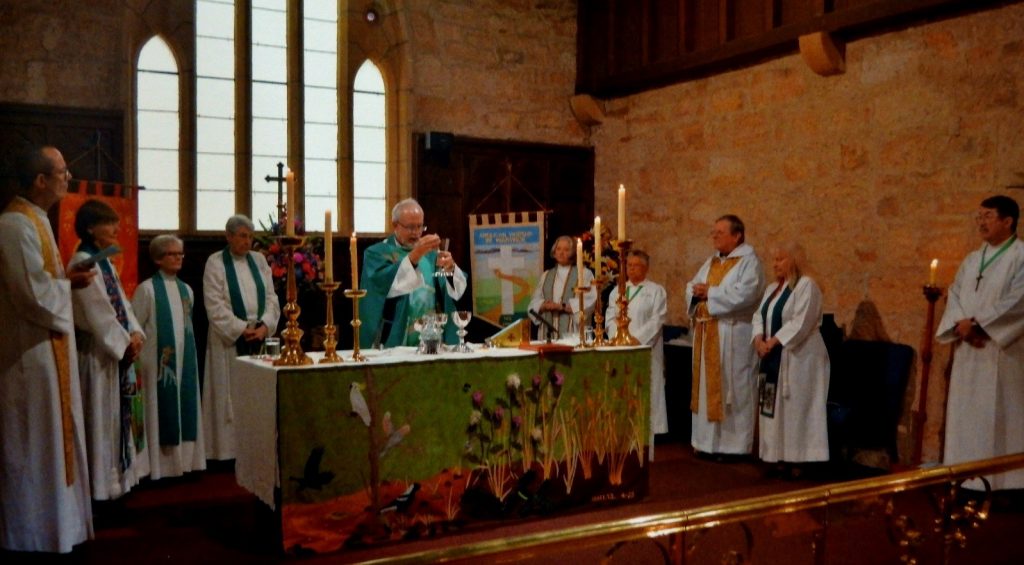
The Ven. Rod Winterton’s final Eucharist as Rector of Warwick with Bishop Cam, Archdeacon of Toowoomba The Ven. Mark Carlyon, Area Dean The Rev’d Laurel Raymond and clergy of the parish, The Rev’ds Heather, Val, Barbara, Rosemary and Stephanie and LAs Ruby and John
What advice do you have for couples who are new to the roles of being a clergy person and a spouse of a clergy person?
Dianne: Be yourself, don’t feel you have to rush into anything, and allow yourself some time to settle into the Parish before taking on new commitments or roles.
Rod: As Dianne says – be yourself. The best advice that I can give is to love the people with whom you are ministering. As our Archbishop reminded us recently, if you have to exercise authority you don’t really have it. Trying in our own inadequate way to model Christ is what I think we are called to do, especially when we are in leadership roles. Servant leadership means putting ego to one side and being authentic and honest to oneself. You can’t fool God, but sometimes we are guilty of fooling ourselves.
Advertisement
Can you tell us a little about your personal faith journeys?
Rod: At 18 years of age, I walked out of our church, angry and disenchanted and attended intermittently until Dianne and I became engaged and we started worshipping at the church in which we wished to be married. We continued our involvement at Holy Trinity, Fortitude Valley until our second child was born, when we started worshipping locally in Samford. I was asked to attend a Cursillo weekend and was also asked to serve on Parish Council. I did an introductory Clinical Pastoral Education course with the idea of being a volunteer hospital pastoral visitor; however, I was encouraged by those running the course to explore the idea of ordained ministry. I was ordained Deacon in 2001 and priest in 2002. I ceased veterinary practice in 2004 and took up a role as fulltime priest at Kelvin Grove.
Dianne: I was baptised Anglican, but mainly came to church with good neighbours. I was confirmed as a young teenager, and through high school, had a Seventh Day Adventist friend, and went on church camps etc. As a young adult I had a bit of a hiatus, until after Rod and I met, and we both felt we would like to have a more Christian marriage and life, and so I returned to Church. Our children were all baptised and attended Sunday School and then Rod started pursuing his theological studies.
How does your faith inspire you and shape your outlook, life choices and character?
Rod: My faith helps me to make sense of life and helps me to support others who are experiencing personal crises. It also inspires what is now called ‘mindfulness’ by pop psychologists, in that I feel loved and valued not for what I achieve or don’t achieve, but for attempting to live a Gospel-centred life.
Dianne: My faith keeps me positive, as I know God is in charge. It has made me a lot more relaxed and patient, as I don’t have to feel like I’m in charge when the bigger picture is a little elusive at times. My faith also makes me more open to life and opportunities, which I may not have even considered ‘under my own steam’. I think, too, it is easier as a Christian to always consider the other viewpoint, or the underdog, as it makes one a lot less selfish and driven materially.
What is your favourite scripture and why?
Rod: Psalm 139 because of the way that it communicates the intimacy of our relationship with God. When I was contemplating exploring a vocation the then Archbishop’s chaplain Lyall Turley read that psalm with me and reminded me that you can fool a lot of people, examining chaplains and yourself included, but God knows what lies at the very core of your being. I also find Matthew 25’s parables helpful when asked what it is to be a Christian.
Dianne: Psalm 19: ‘Let the words of my mouth and the thoughts of my heart be acceptable to you O Lord’. This text makes me mindful of what I think and say, that those thoughts and words reflect God’s love for me and of how I am called to love and respect others.
What person of faith inspires you the most and why?
Rod: The aforementioned Lyall Turley was one of those people and Dianne and I had the joy of having dinner with him several months before he passed away. His contribution to the life of the church in Australia and New Guinea has never been properly acknowledged, but I think that he would have wanted it that way.
Dianne: Numerous inspirational people touch our lives daily, but two who spring to mind for me are a dear friend, with whom I grew up, and who now makes multiple trips annually to India, evangelising with her Church. And the other is the mother of a young disabled man who suffered an acquired brain injury as an adult.
What are the primary strengths of the Church and what is the best way to make the most of these for the benefit of our communities?
Rod: The Anglican Church was founded on a rich heritage of both the formal observance of faith found in the Church of Rome and the early Celtic church and its saints that evangelised Britain. Drawing on this heritage, we can be a church that meets people where they are at and draw them into the mystery that is God through our traditions and the way that we express them, our inclusivity, and the way that we model the legacy of Christ and early Christian communities.
Dianne: I see some of the strengths of our Anglican Church are our traditions, our inclusivity and our sense of community. The best way to make the most of these for the benefit of our communities is to keep up our traditions, and by being welcoming and inclusive of all, and by involving ourselves in our local communities as and where possible – to ‘meet people where they are at’. Small groups and a sense of belonging to each other and the greater whole are a wonderful way to draw people into a closer communion within the church.
What are the primary challenges currently encountered by the Church and what is the best way to overcome these for the benefit of our communities?
Rod: We continue to try to maintain a pattern of ministry that may not serve us as well in this century as it served us in the last. The major challenge is the age profile of the Anglican Church. Overall the statistics tell us that we are a church for the over 60s. Young people and families still need the support of a community and yet fewer of this demographic seek that support from the church. Partly this is because of at least two generations of disengagement with formal religion of any sort, partly because the church is an easy target for a significant section of the media, and partly because of the behaviour of a small minority of people within the church that makes it such a target of vilification. The key to turning this around is to actively seek to engage with the wider community and not wait for them to come to us. By that I mean ‘walking the walk’ as well as ‘talking the talk’.
Dianne: I think one of our strengths – our traditions – can also be a challenge. As long as we are open to the needs of all, by for example having a variety of service options, hopefully we can stay relevant and important in people’s lives. Using current technology and attracting younger parishioners, and allowing and encouraging ownership of roles, and responsibilities within the Parish are also important ways forward.
What do you do in your free time to recharge and relax?
Rod: I have become a keen golfer, I love reading and listening to music, and I love to travel.
Dianne: I like to sew, read and garden, and to catch up with family and friends.
What is your favourite book and why?
Rod: Looking at my bookshelf, there are so many favourites but one that stands out is an obscure book A Creed for the Third Millenium by the late Colleen McCullough, which is a rich field for theological reflection and is relevant to our current grappling with climate change.
What is your favourite movie and why?
Rod: I still remember the night that I saw the first Star Wars movie. It was an audio-visual experience the likes of which I had never been a part of and yet was a classic retelling of the eternal story of the battle between good and evil, darkness and light.
Dianne: Not a movie but a television series Call the Midwife, based on a series of books by Jennifer Worth and set in the East End of London in the 1950s. They are stories of compassion, sorrow and joy and a reminder of the sacrifice sometimes made by those whom God calls to serve Him.
What is your favourite travel destination and why?
Rod: I love Japan and have visited nine times. The unfailing generosity and manners of the Japanese, the beautiful scenery, food, and unmatched powder snow keep calling me back.
Dianne: I probably don’t have a favourite destination, as there is so much of the world yet to see, but we have made several short trips to Japan to ski. As a cultural experience it is amazing, the people are very dignified, and respectful, the country is clean, safe and well organised, and the skiing is fantastic! But don’t tell any other Aussies – there are almost too many of us there now!
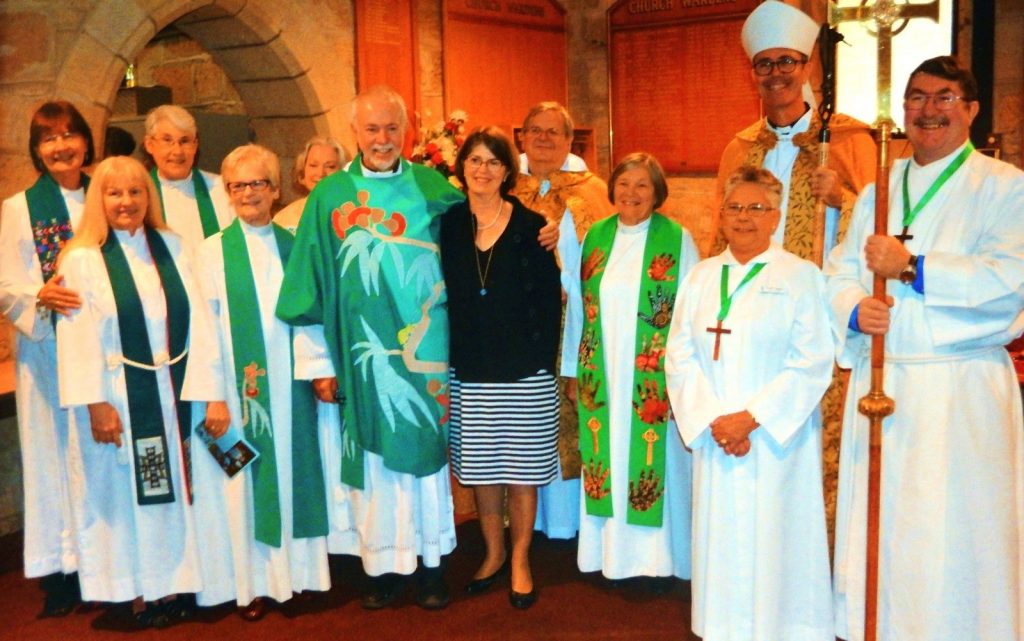
The Ven. Rod and Dianne Winterton, their wonderful team and Bishop Cam Venables after a service
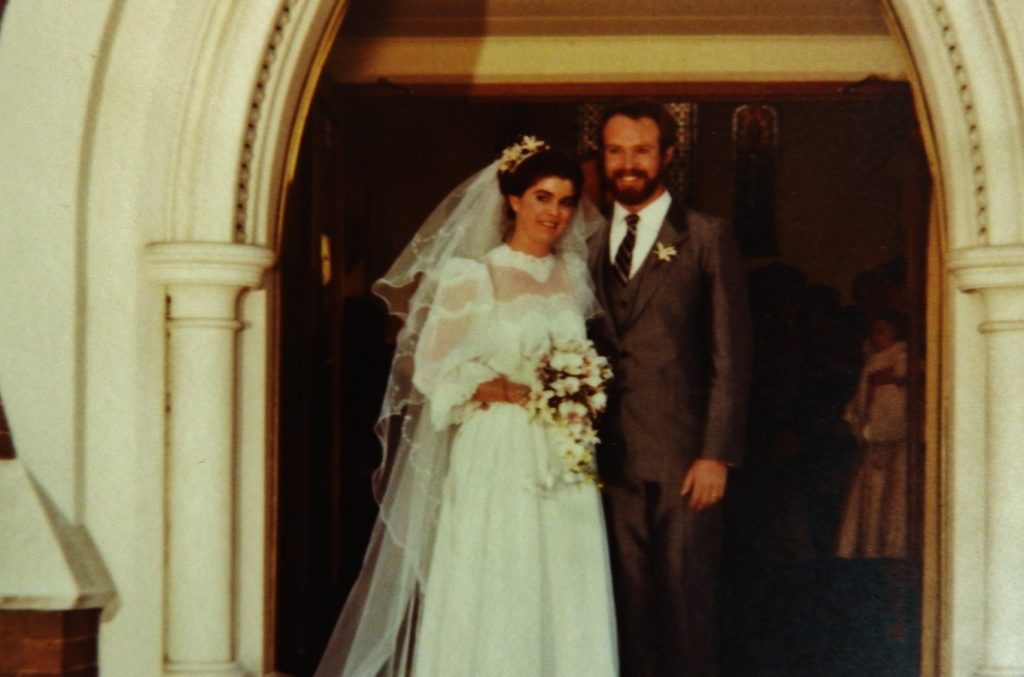
Rod and Dianne on their wedding day at Holy Trinity Church, Fortitude Valley in August 1983

